How Phenomenology became Phaneroscopy: Peirce’s project of “high philosophy”
DOI:
https://doi.org/10.6093/1593-7178/5919Keywords:
High Philosophy, Husserl, Peirce, Phaneroscopy, PhenomenologyAbstract
Charles Sanders Peirce (1839-1914) worked in the latest years of the XIX century on a classification of sciences that included phenomenology, beside metaphysics and normative sciences. He wanted these triadically distinct in esthetics, ethics and logic. This vision of phenomenology is clearly different from Husserl’s. Nonetheless, there are some analogies. First of all, the idea that phenomenology has to deal with what is present to the mind in any moment and in any sense. For Peirce this presence is triadically said: as Firstness, Secondness and Thirdness. It is the presence of an experience, plus its interpretation. It is a Third, that is, a signification, that bridges the divide between a First and a Second, the pure quality and the pure given of the experience itself. This leads us to underline the differences between the two phenomenologies. It is not by chance that Peirce begins, in the first years of the new century, to call it “phaneroscopy”, from the greek word “phaneron” and to appeal to an “High Philosophy” as its fulfillment. If Husserl’s theory is grounded on the principle of evidence, Peirce opposes to it the force of inference; if Husserl appeals to intuition, Peirce denies it any legitimacy, referring to triadic relations of signs (semiosis) as the leading-principle of reasoning and certainty. The beginning of our philosophical experience is not the pure and undoubtable apprehension of the thing itself, but the sign relation that mediates between a sign, an object and its Interpretant. This relation is eminently fallible and dynamically ever-changing.
Downloads
Downloads
Published
How to Cite
Issue
Section
License
The author retains the copyright of his work whilst granting anyone the possibility “to reproduce, distribute, publicly communicate, publicly exhibit, display, perform and recite the work”, provided that the author and the title of the journal are cited correctly. When submitting the text for publication the author is furthermore required to declare that the contents and the structure of the work are original and that it does not by any means compromise the rights of third parties nor the obligations connected to the safeguard of the moral and economic rights of other authors or other right holders, both for texts, images, photographs, tables, as well as for other parts which compose the contribution. The author furthermore declares that he/she is conscious of the sanctions prescribed by the penal code and by the Italian Criminal and Special Laws for false documents and the use false documents, and that therefore Bollettino Filosofico is not liable to responsibilities of any nature, civil, administrative or penal, and that the author agrees to indemnify and hold Bollettino Filosofico harmless from all requests and claims by third parties.

